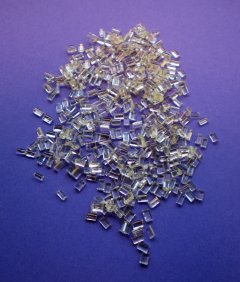Mar 15 2009
A technology developed by FRX Polymers, Inc. for producing engineering thermoplastics that are inherently flame retardant and environmentally friendly has received the first-place award in the Clean Technology Business Forum and Competition, it was announced today by the Society of Plastics Engineers (SPE). Organized by SPE’s Environmental Division, the event took place at the recent Global Plastics Environmental Conference (GPEC) in Orlando, FL.
 Environmentally friendly plastic with inherent flame retardant properties developed by FRX Polymers.
Environmentally friendly plastic with inherent flame retardant properties developed by FRX Polymers.
The second-place honor went to PolyNew, Inc., for a new class of bioplastics.
Sponsor of the competition was Battelle, the international non-profit R&D organization. The competition was judged by representatives of Battelle, Cascadia Capital, Emerald Technology Ventures, Modern Plastics Worldwide magazine, and SPM Technologies. Eric Koester, an attorney with the law firm Cooley Godward Kronish LLP, served as coordinator of the Clean Technology Forum.
“SPE’s Clean Technology competition is an opportunity for inventors, emerging companies, and established firms with revenues under $1-million to present innovations that make possible the use of materials and energy from renewable sources, substantially reduce resource consumption, or dramatically reduce or eliminate emissions and waste,” said Environmental Division chairperson Susan M. Kozora, engineering manager of International Automotive Components (IAC).
Award Winners Open New Possibilities for Engineering Resins and Packaging
First place winner FRX Polymers, Inc. is a pilot stage specialty polymer company that has developed a family of inherently flame retardant engineering thermoplastics which are transparent, tough, environmentally friendly, and cost effective. Because the phosphorus-based flame retardant system is bound into the polymer, it is non-volatile and non-migrating. The plastics have the highest limiting oxygen index of all known commercial thermoplastics, according to FRX Polymers.
FRX recently announced an agreement with Uhde Inventa-Fischer to build and operate a 500-ton semi-works polymer plant at the UIF facilities in Switzerland.
The company expects its new materials to find use both as flame retardant additives and as specialty thermoplastics. The products have already been applied as polycarbonate-like plastics for thin, transparent applications; as the key component in high-heat distortion, hydrolysis-resistant PC/ABS formulations; and as a polymeric flame retardant additive for high flowing, glass reinforced PBT-based electrical connectors.
The president and CEO of FRX Polymers is Marc Lebel; chief technology officer is Dieter Freitag, Ph.D. www.FRXpolymers.com.
PolyNew, Inc. the second place winner in the competition, has developed a new class of PLA bioplastics which it terms “ecobionanocomposites.” These are nanocomposites from 100% renewable resources. They exhibit high heat resistance and clarity at a low cost. The company’s PLA blends have been used in applications such as solid and foamed trays for microwaveable food and other packaging. PolyNew is commercializing a series of bioplastic formulations in the form of industry standard pellets that could be used in a wide variety of applications
PolyNew is a technology development company. The executive team of PolyNew includes Laura Hollingsworth, president, and John Dorgan, Ph.D., chief technology officer and a professor at the Colorado School of Mines. www.polynewinc.com.